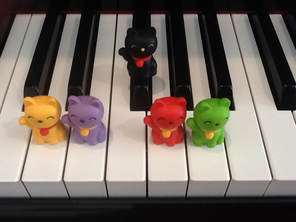
Teaching young beginners can be both challenging and rewarding. There are many, many method books aimed at the young beginner--more than I could possibly cover in a short blog post! So instead of focusing on the books I use in my lessons, I would like to share some tips on how I structure my lessons (and my expectations) to make lessons with young students an enjoyable experience for all!
Focus on skill building. I have found the best way to work with my youngest students is to focus on helping them to build the skills necessary to play the piano. Only a small part of our lesson might be spent playing the piano; I spend much more time with my young students working on things like keeping a steady beat, exploring keyboard geography, developing fine motor skills and freedom of movement, training their ears to hear high and low sounds...and the list goes on! These are all important skills that young students need to master in order to excel at the piano.
Learn through play. Young beginners learn the best through creative activities that allow them to use their imaginations. I like to incorporate stuffed animals, puzzle erasers (pictured above), and other manipulatives into our lessons to make learning more fun and memorable. A few of my favorite activities:
- Bounce the mouse: we bounce a toy mouse on the piano keys to practice freedom of arm movement and develop a nice non-legato touch. First, the student bounces the mouse as I play each finger; then we trade and I bounce the mouse as the student plays.
- Make a house: we practice "making a house" (creating a nice round hand shape) for one of our puzzle erasers.
- Float the balloon: we imagine a balloon is attached to our wrist, causing our hand to float loosely up in the air. When the balloon pops, we drop our arm down into our lap. This is great for developing a flexible wrist and introducing the concept of arm weight.
- Last Mouse Lost: this finger dexterity game contains little bubbles that students must press down with firm fingertips. (Just google the title for buying options in your area.)
- iPad apps: a couple of my favorites for young beginners are the Music for Little Mozarts app, which has nice ear training activities as well as naming notes on the staff and keys on the piano; and Rhythm Swing, an app that teaches rhythm and helps students keep a steady beat.
Review, review, review! When working with young beginners, I make sure that every lesson contains lots of review of concepts covered in previous lessons. Vocabulary, note names, technical concepts--all of these should be reviewed at each lesson. I also help my young students to develop and maintain a little repertoire list of piano pieces that have been mastered in previous lessons. This not only helps to ensure that young students don't forget any important ideas, it also helps to build their confidence!
Rotate activities frequently, but have a routine. As I am sure you know, young beginners have short attention spans! This can be one of the most challenging aspects of working with young students--keeping them engaged throughout an entire piano lesson. I try to have several short activities planned, including on-the-bench and off-the-bench activities, so that when I see a student's attention beginning to wane I can switch things up. I also find it helps to have a consistent routine that we can follow in our lesson. For example, we always start by playing a review piece, followed by doing a technique game. Then I introduce new material close to the beginning of the lesson, while a student is the most attentive. I always end the lesson with iPad games and writing out our practice "homework," which gives me a chance to ask review questions about the material we have covered in that lesson. I find that young students are more likely to stay focused if they know how many tasks are left before the lesson is done.
Make assignments clear and simple. Developing a daily practice routine that involves both parent and child is important for young beginners. I send each student home with a clear assignment sheet for the parent to use at home, and I try to limit assignments to 3 or 4 short tasks that can be completed in five minutes or less, total. Students might also enjoy teaching their parents or siblings a song, or playing a "mini-recital" of favorite pieces for their family--these activities will help get the whole family involved in practice time so that it doesn't feel like an isolated activity for the student.
What do you think? Do you teach young beginners? Do you have a teaching tip or favorite activity that you like to use? Please share in the comments!

 RSS Feed
RSS Feed